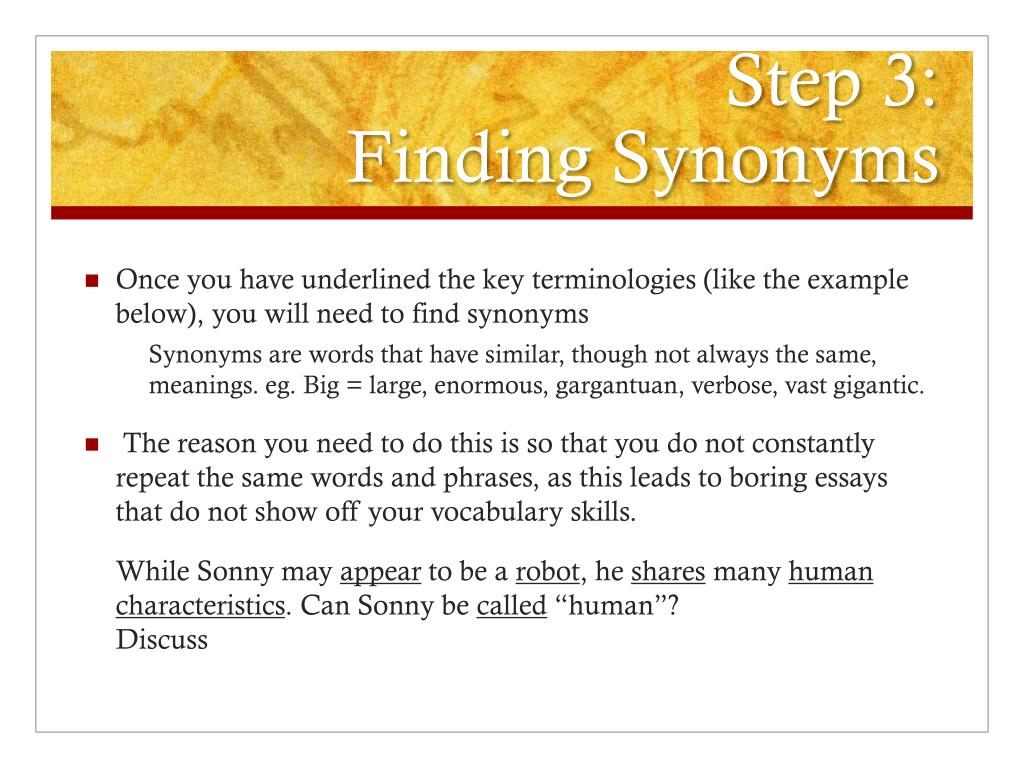

RESEARCH FINDINGS SYNONYM HOW TO
Learn how to avoid plagiarism by using synonyms carefully. The problem arises with the beginners who are still a novice in this regard. The writers, publishers, and bloggers who are quite experienced in the field and have a grasp over the art of writing are well aware of the dos and don’ts to avoid plagiarism in any written piece. Plagiarism Resources Take a deep dive into plagiarism and learn how to avoid it.Help Center Get the support you need regarding integration, platforms, dashboards, and more.News & Media The go-to spot for recent Copyleaks announcements, updates, news, and other media features.Blog Your resource for learning about the best plagiarism practices, latest findings, and more.Case Studies Learn how Copyleaks has helped various industries identify plagiarism, safeguard content, ensure originality, and find solutions.About us Meet the Copyleaks leadership team and learn about who we are.LMS Integration Easily check for plagiarism from within your own LMS platform.API Integration Seamlessly integrate plagiarism detection and content authentication into your own native platform.Plagiarism Detector Instantly detect direct plagiarism, paraphrased content, similar text, and verify originality.

Chrome Extension Get the AI Content Detector Chrome extension and verify what was written by a person or AI generated.LMS Integration Easily detect AI content within your own LMS platform.API Integration Instantly integrate enterprise-level AI content detection into your native platform.AI Content Detector The only enterprise solution designed to verify whether content was written by a person or AI.Put together - assemble, compose, synthesizeĪs teachers, it is important that you not only teach the meanings of phrasal verbs, but also see to it that students understand the appropriate registers for their use.

The list below illustrates this fact.īefore the hyphen are selected English phrasal verbs After the hyphen are nonphrasal synonyms of French, Latin, or Greek origin. As a result, hundreds of native English phrasal verbs have French, Latin, or Classical Greek counterparts with almost the same meanings but with a slightly more erudite ring to them. As a result, while the native phrasal verb continued to evolve naturally in the population to express ordinary needs and topics, foreign words provided people with a scholarly and scientific vocabulary.Įven today, English continues to evolve along these two parallel paths. Nuances of a word like foretell could be expressed with the Latin word predict or with the Greek word prophesy. Coincidentally, at that time many educated people also knew how to read and write Latin and Classical Greek so they turned to these languages as well to find new words for English in order to help them keep up with new fields of learning for which there were no English words.Įnglish became laden with foreign terms that vied with native English words to express shades of the same idea. And since French was the language of the educated people at that time, it was inevitable that scholars would draw new words from the French language in order to help replenish the impoverished English language ( Nist, 1966).
RESEARCH FINDINGS SYNONYM FREE
Then, in 1204, England became officially separated from France again and the English language was once more free to flourish.īy this time, the English language had become uncultivated. During this time, the French language came to dominate the upper echelons of English society while the English language was allowed to languish.

In 1066, William the Conqueror of Normandy placed all of England under an occupation that was to last for almost a century and a half. This event was the Norman French occupation of England. While the phrasal verb was evolving naturally in the English language, an event happened that caused English to evolve along two parallel paths. This is only a tendency nevertheless, it is a salient one and it has a long history. In formal written communication, however, people often prefer to use English verbs derived from French, Latin, and Classical Greek. In English, there is a tendency to use phrasal verbs more in spoken and colloquial communication than in formal writing.


 0 kommentar(er)
0 kommentar(er)
